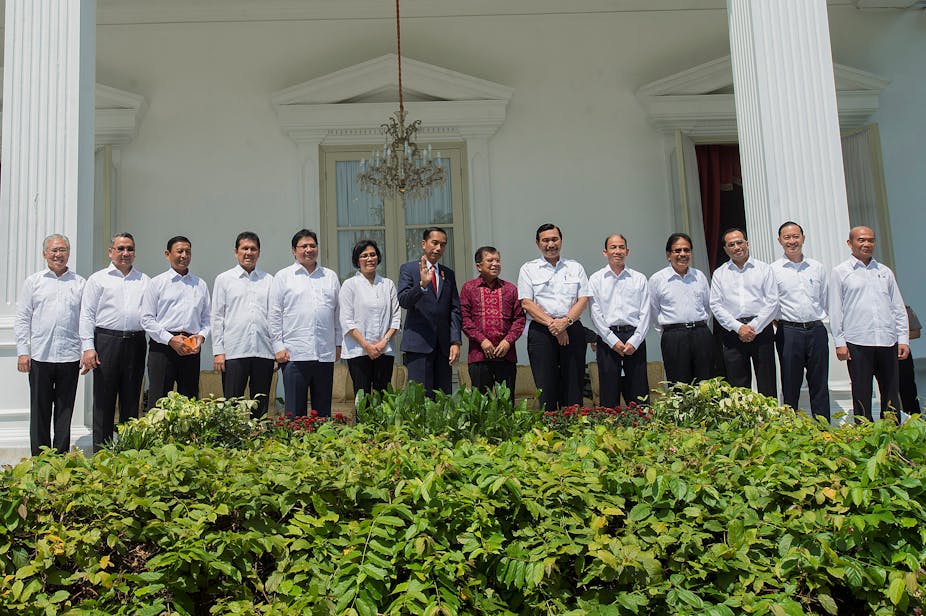It is not surprising that the new ministers recently appointed by Indonesian President Joko Widodo still reflect a cabinet of compromise.
As a political outsider, the president lacks the support of a strong political machinery. In the context of Indonesia’s oligarchical system he has little choice but to succumb to political transactions.
Jokowi, as the president is popularly known in Indonesia, announced changes to 13 ministerial and ministerial-level posts in his cabinet last Wednesday. His most celebrated pick is reformist economist Sri Mulyani as finance minister, a position she held during Susilo Bambang Yudhoyono’s administration.
But aside from Mulyani, Jokowi also appointed retired general Wiranto, once indicted for crimes against humanity in the bloodletting during East Timor’s breakaway from Indonesia. Now the chairman of Hanura (People’s Conscience Party), he will serve as co-ordinating minister of politics, legal and security affairs.
Jokowi also gave one ministerial position each to the People’s Mandate Party (PAN) and Golkar Party. These parties recently switched sides from being part of the opposition coalition to declaring their allegiance to Jokowi’s administration.
The price of compromise
The market responded positively to Mulyani’s appointment.
Nevertheless, the great expectations of Mulyani have distorted the issue of the political horse-trading that shaped the new cabinet.
To make way for Golkar and PAN in the cabinet, Jokowi sacked two Hanura ministers.
To compensate for this, Jokowi gave Wiranto a seat in the cabinet, despite protestations from human rights groups.
Jokowi left untouched cabinet posts held by representatives of the Indonesia Democratic Party of Struggle (PDI-P) regardless of their performance.
By granting ministerial positions to party representatives, Jokowi gives these parties political incentives to continue supporting his administration in the parliament.
With the addition of Golkar and PAN, Jokowi now has support from 69% of the members of parliament. Before the two parties aligned themselves with Jokowi’s coalition, he had only 46.5% support from the parliament.
This shows that in Indonesian politics being part of the opposition is merely a strategy of political elites to increase their bargaining power.
Away with ‘difficult’ ministers
The dismissals of Ignasius Jonan as transportation minister and Rizal Ramli as co-ordinating minister for maritime affairs may have been caused by their dogged attitudes to following the rules, which interfered with Jokowi’s infrastructure programs.
Jonan had rejected Jokowi’s plan to build a 142km bullet-train line from Jakarta to Bandung. For Jonan, giving the private sector exclusive rights over a public facility was against the law. Jonan also sees that outer-Java islands need rail lines more than Java.
And as Jokowi wants to rush this lighthouse project before his administration ends, the ground-breaking ceremony in January 2016 was held without a completed construction permit or environmental impact and commercial viability analysis – problems that also become Jonan’s concern.
Meanwhile, Ramli insisted on suspending the Jakarta Bay reclamation project due to conflicts of interest among the authorities issuing permits. The project has been widely criticised by environmental and urban planning experts.
In 2014 and 215, Jakarta Governor Basuki Tjahaja Purnama – who was Jokowi’s deputy when the latter was governor of Jakarta – renewed permits for nine developers to construct 17 islets in the Jakarta Bay. Ramli’s statement to suspend the permits was made without consultation with Jokowi, according to the Jakarta governor.
Setback in commitment to human rights
Wiranto’s appointment as security minister signals a setback in Jokowi’s commitment to resolve human rights concerns.
Jokowi will most probably disregard the objections from activists regarding Wiranto’s questionable human rights record.
As a result, attempts to resolve human rights abuses might stagnate. Considering Wiranto’s connection with paramilitary groups in the past, vigilante violence may also increase.
Against this backdrop, while human rights problems receive less attention compared to the government’s new economic team, Mulyani’s appointment may actually be more of a strategy to maintain Jokowi’s popularity.
Jokowi is showing growing prowess in playing the political game. But that doesn’t translate into much benefit for the public. In the end the main beneficiaries of the new cabinet remain Indonesia’s political elites.

